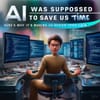Artificial intelligence was supposed to revolutionize our lives by automating mundane tasks and freeing up time for more creative and strategic pursuits. However, the reality is that AI is often making us busier than ever. While AI tools like ChatGPT can handle repetitive tasks, generate ideas, and automate workflows, they're not perfect.
One of the main reasons AI is increasing our workload is that it's not always accurate. AI-generated content can be riddled with errors, and relying on outdated data can lead to more work in the long run. Moreover, AI requires constant monitoring and correction, which can be time-consuming and labor-intensive.
Another issue with AI is that it can create a sense of dependence on technology. Over-reliance on AI tools can lead to decreased critical thinking skills and increased stress. Furthermore, AI-generated content often lacks the nuance and empathy that humans bring to tasks, which can lead to a lack of authenticity and connection with others.
To get the most out of AI while minimizing its drawbacks, it's essential to use it as a tool, not a replacement for human judgment and creativity. By verifying AI-generated content, focusing on high-level tasks, and leveraging AI to augment human capabilities, we can harness its power to improve productivity and efficiency.
In reality, AI is a double-edged sword. On one hand, it has the potential to automate tasks, provide insights, and enhance decision-making. On the other hand, it requires careful management and oversight to ensure that its benefits are realized. By understanding the benefits and limitations of AI, we can use it to improve our lives without sacrificing our well-being.


